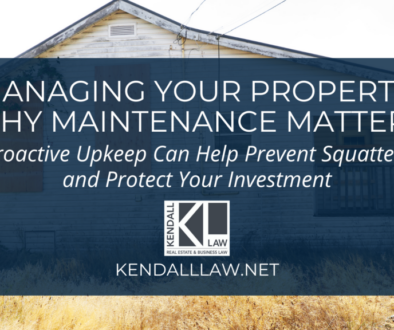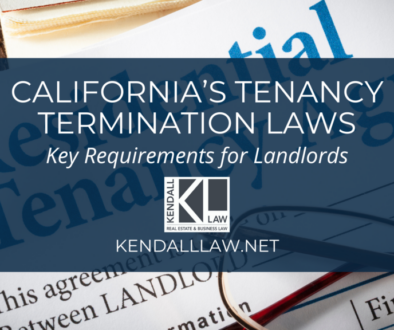Business & Real Estate Law Updates for 2021
Let’s take a quick look at some important changes in business and real estate law coming up in 2021.
Real Estate Law Updates
AB 2345 – Density Bonuses
The purpose of the density bonus law as enacted in 1979 was to help address the affordable housing shortage and to encourage development of more low- and moderate-income housing units. However, California still faces the same issue with over 40% of California households spending a high amount of their income on housing. In light of this reality, California has adopted a bill that further expands concessions and incentives to developers that seek a density bonus on top of the cities’ zoned density in exchange for including extremely low to moderate income housing. Specifically, AB 2345 allows developers to increase their density bonuses — the number of units permissible on any plot of land — to 50%, depending on the number and level of deed-restricted affordable homes on a piece of property. Under existing density bonus law, developers are able to receive up to a maximum of a 35% bonus of allowed density. In addition, the bill allows local governments to grant additional waivers for projects located within a half-mile of transit and which are 100% affordable and incentivizes additional density bonus projects by reducing the maximum parking required for certain projects. [Read the Bill Here]
AB 725 – Zoning for Moderate-income Housing
AB 725 was sponsored by Assemblywoman Buffy Wicks. The law is hailed as a win for affordable housing for some groups though others stand in opposition. The law mandates that areas containing moderate to above moderate-income housing be zoned for fourplexes. AB 725 requires that cities designate sites to meet at least 25 percent of a jurisdiction’s share of the regional housing need for moderate-income housing, and at least 25 percent of a jurisdiction’s share of the regional housing need for above moderate-income housing. The law requires zoning that allows at least four units of housing, but not more than 100 units per acre of housing. [Read the Bill Here]
SB 1079 – Homes for Homeowners, Not Corporations
The strong message behind SB 1079 is that homes are for homebuyers and not the corporations. SB 1079 takes away the power corporations have in the ability to buy homes in bulk as they did during the Great Recession. The law modifies the foreclosure process by giving owner-occupants, tenants, local governments, and housing non-profits a fair chance at also purchasing homes. There is also a clause to place fines on corporations or other owners that leave homes vacated, up to $2,000 a day with a 30 day opportunity to cure the violation. A group by the name of Moms 4 Housing made national headlines when they took over a vacant property in West Oakland. They further highlighted the severity of the problem in housing being bought out by corporations and left blighted. SB 1079 would change the landscape and make owner occupied housing more of a reality. The provisions will apply to all residential properties with one to four housing units. [Read the Bill Here]
AB1885 – Homestead Exemption
The purpose of the homestead exemption is to protect the family residence from creditors, even in bankruptcy. However, the amount of value protected varies from state to state. In California the amount protected used to be capped at $75,000 for singles and at $100,000 for married couples. Seniors and the disabled were capped at $175,000. However, on September 18, 2020 Governor Newsom brought into effect AB 1885 which increased the CA exemption. As of January 21, 2020, the homestead exemption will be increased by at least $300,000 for everyone. However, in some counties it may be even greater since the exemption will be based on the greater of $300,000 or the countywide median sale price of a single-family home in the previous calendar year (up to a cap of $600,000). For example, in Los Angeles the median sale price in 2019 was $635,000, which means most LA homes will be fully protected from creditors. Moving forward the values will be automatically adjusted for inflation. Overall, what this means for homeowners is that they may now file for bankruptcy under Chapter 7 without fear of losing their homes. [Read the Bill Here]
AB 2463 – Limited Creditor Rights to Levy Residence
AB 2463 effectively prohibits a judgment creditor from seeking a sale of the judgment debtor’s principal residence to enforce a judgment lien, with certain exceptions such as for credit unions representing debt owed to financial institutions. The law mainly limits a creditor’s right to levy on a member’s principal residence, but it does not eliminate it. [Read the Bill Here]
AB 38 – Fire Retrofit Program for At-risk Communities
“More than 2 million California households, approximately one in four residential structures, are located within or in high fire hazard severity zones, and our communities need our help to adapt,” stated assembly member Jim Wood who authored AB 38. In essence the bill established a 5-year pilot program requiring California’s Office of Emergency Services and Cal Fire to work together and utilize funding in support of at-risk communities through a statewide fire retrofit program. The program would provide for hardening measures to take place in an effort to help homes survive wildfires. The idea is to encourage cost effective structure hardening.
AB 38 will also help educate home buyers in fire-prone areas by requiring property sellers in those areas to inform buyers that the property follows established wildfire protection measures, including fire hardening improvements on the property and a disclosure notice to also include the State Fire Marshal’s list of low-cost retrofits. [Read the Bill Here]
Prop 19 – Property Inheritance Tax
51% of voters said yes to Prop 19 in California bringing forth changes to inheritance laws. Essentially Prop 19 modifies Prop 58 which excluded tax reassessment on properties passed down to children by the parents, allowing for lower property taxes and major tax savings. Prop 19 will now require the property owners to make the home their primary residence to continue to enjoy the same tax savings as before. Otherwise, the home will undergo a tax readjustment when passed down or sold. It’s important to note that if the home passed on to children has a value of over $1,000,000 the rules are a bit more complicated. For your own protection, please seek the advice of a qualified tax professional and estate planning attorney for a full understanding of your estate plans.
Expansion of Homeowner Bill of Rights
As of September 1, 2020, the California Judicial Council rules that temporarily halted foreclosure and evictions expired. AB 3088 however, extends those protections to small landlords until January 1, 2023. Certain protections are applied to first lien mortgages and deeds of trust that are: (1) Secured by residential real properties that contain no more than four dwelling units and meet other criteria, and (2) Are occupied by tenants who can’t pay rent because of a reduction in income due to the coronavirus crisis. (Cal. Civ. Code § 2924.15). Generally, a small landlord refers to someone who owns residential property with up to four dwelling units and owns no more than three. In general, below are highlights of the Homeowner’s Bill of Rights for your reference:
- Dual tracking is prohibited. This happens when a lender or servicer tries to foreclose on property for which an application for loan modification is pending.
- A single point of contact was established to provide homeowners with an easier way to communicate with the lender rather than having to explain a situation multiple times to different lenders.
- Prior to any foreclosure the lender is to provide the borrower with different alternatives. The lender would not be able to record a default until 30 days after contact with the borrower.
- Homeowners have a right to sue for violations of the Homeowner Bill of Rights.
Business Law Updates
AB 2257 – Modifications to AB 5
You may remember CA passed AB 5 which changed the law with respect to independent contractors. The purpose was to expand California’s Supreme Court ruling in Dynamex Ops. West v. Sup. Court (Lee) 4. Cal.5th 903 (2018). An “ABC” test was created for independent contractor relationships, specifically for certain claims under the California’s Industrial Worker Commission Wage Orders. Whenever the ABC test did not apply, the “Borello” test was still potentially applicable. As a quick reminder, the “Borello” test was a totality of circumstances test and the “ABC” test was a three-prong test that must be met. Many concerns were raised under AB 5 which has now brought about changes through AB 2257. AB 2257 effectively replaces AB 5 by repealing Labor Code Section 2750.3. However, most of the prior definitions were kept intact and moved to Labor Code Section 2775.
Let’s take a quick glance at one of the exceptions that was modified by AB 2257:
Business to Business Exception. This was somewhat relaxed. Formerly it was codified in Section 2750.3(e). Previously under AB 5, the ABC Test applied if the vendor’s employees were directly working with customers of the other business. For example, a business could provide wait staff to a hotel, in such cases the ABC test would have applied because the staff is for the hotel’s customers. This changes slightly under AB 2257 as follows:
The business service provider is providing services directly to the contracting business rather than to customers of the contracting business. This subparagraph does not apply if the business service provider’s employees are solely performing the services under the contract under the name of the business service provider and the business service provider regularly contracts with other businesses.
Thereby allowing some businesses to escape the ABC test even though workers are provided to the other business. Furthermore, more small businesses will qualify for the business-to-business exception because your residence will count as a business location. In AB 5 you had to have a business location to take advantage of the exception.
Moreover, AB 2257 added a provision that would apply to one-off engagements. For example, a DJ could be hired by a catering company. Since both operate under their own business entity they would fall under an exception to not be treated as an employee/employer relationship for the purposes of one specific event they are both working for. For further details, see Section 2779. [Read the Bill Here]
Reach out to us at Kendall Law to learn more about these changes and how they affect your particular situation. For a consultation, contact Kendall Law at (310) 619-4941.
Author: Eileen Kendall





